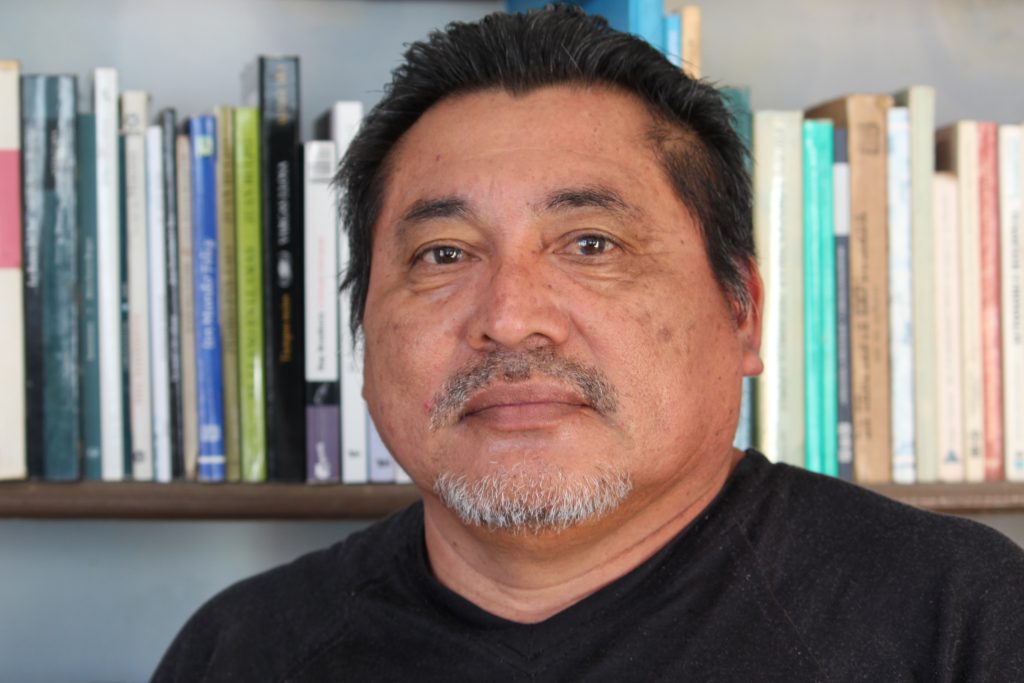
Pedro Uc Be, who uses the pseudonym Lázaro Kan Ek when he writes, is a poet and activist from Buctzotz, Mexico, on the Yucatán Peninsula. Born in 1963 and still actively working, he writes in his native Mayan language, and is an avid promoter of its use (Ic Xec). He is also an activist who works for the preservation of Mayan culture and land, and fights against big projects that disrupt the natural environment and the lives of the people living in it—themes that make their way into his writing (Front Line Defenders).
Pedro Uc Be is associated with an organization called Múuch’ Xíinbal, which is based in the Mayan communities of the Yucatán and protects land from “megaprojects,” like tourism sites and ecotourist attractions (Asamblea de Defensores del Territorio Maya). Though ecotourism is promoted as being good for the environment, its inception often pushes native people off of land they have lived on for years (Ávila-García, Sánchez and Furio 61). Múuch’ Xíinbal and Uc Be believe that the land is non-negotiable. It is for sustenance and learning, and it is a source of life that large, often foreign, companies should not be able to take for their own economic benefit (Asamblea de Defensores del Territorio Maya). With the help of Múuch’ Xíinbal, Uc Be fights for Indigenous people’s right to the land while continuing to celebrate his heritage in a variety of ways, including his commitment to writing poetry in his native language and his hesitancy to enter writing competitions if he has to translate the poetry into Spanish (Ic Xec).
Recently, Uc Be and Múuch’ Xíinbal have focused on the construction of the “Mayan Train” that would connect towns and cities across the Yucatán (Front Line Defenders). The Mexican government believes the train will make transport of people and goods cheaper, faster and easier (Jensen). Many people living in small towns along the route are excited by the prospect of increased tourism and greater access to resources and economic development (Jensen). However, many native people, including Pedro Uc Be, believe that the train will disrupt the wildlife’s migration patterns and damage pre-Columbian archeological sites (Asamblea de Defensores del Territorio Maya). These debates are reminiscent of others in Latin American history, over the role of foreign investment in big capitalist projects, or over land reform and the acceptance of Indigenous heritage and culture by those in power. Pedro Uc Be continues this long fight for Indigenous rights and recognition in Mexico.
Sources
Asamblea de Defensores del Territorio Maya. “¿Quiénes Somos?” Múuch’ Xíinbal. Accessed February 25, 2022. https://asambleamaya.wixsite.com/muuchxiinbal/quienes-somos.
Ávila-García, Patricia, Eduardo Luna Sánchez, and Victoria J. Furio. “The Environmentalism of the Rich and the Privatization of Nature: High-End Tourism on the Mexican Coast.” Latin American Perspectives 39, no. 6 (November 2012): 51-67. https://www.jstor.org/stable/41702293.
Front Line Defenders. “Pedro Uc Be.” Accessed February 25, 2022. https://www.frontlinedefenders.org/en/profile/pedro-uc-be.
Ic Xec, José Natividad. “Un acercamiento a Pedro Uc Be, el Siipkuuts de los montes mayas.” El Chilam Balam, March 18, 2017. https://elchilambalam.com/pedro-uc-be-siipkuuts/.
Jenson, Sally. “Mexico’s Mayan train suspension divides Indigenous community.” Aljazeera, April 21, 2021. https://www.aljazeera.com/news/2021/4/21/tren-maya-suspension-fuels-indigenous-community-rift.
